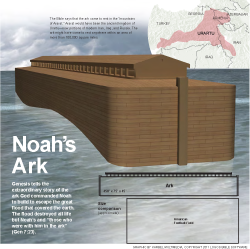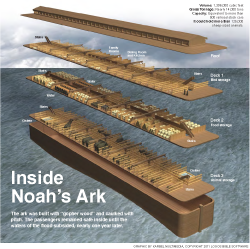6:1–8 This brief narrative bridges the genealogy of ch. 5 and the flood narrative of 6:9–9:29, serving as both a prologue to the flood narrative and a conclusion to the genealogy. As a prologue to the flood narrative, it illustrates the increasing wickedness on earth. As a conclusion to the genealogy, it explains why the long lifespans of ch. 5 have come to an end. Noah serves as the major link between the genealogy and the flood narrative. |
6:1 daughters The ot usually refers to the birth of male children when describing a generation. In this case, the reference to daughters deliberately contrasts with the sons of God (see v. 2).
6:2 the sons of God This Hebrew phrase, bene ha’elohim, and similar phrasings (bene elohim and bene elim) are used elsewhere in the ot only of heavenly beings (Job 1:6; 2:1; 38:7; Pss 89:6; 82:6; see Deut 32:8 and note). Thus, bene ha’elohim could refer to spiritual beings who are members of God’s council—the divine council. The Hebrew phrase bene el-chay (which may be translated “sons of the living God”) is used for the people of Israel in Hos 1:10 and may be an echo of this ancient concept of the divine council (see Hos 1:10 and note).
6:3 My Spirit The Hebrew word used here, ruach, is often used to refer to breath (see Gen 2:7 and note; Job 9:18; 19:17; Exod 15:8; Lam 4:20). This means that this phrase likely refers to the human life span. Human life span is a major theme of this passage.
shall not abide The Hebrew word used here, yadon, occurs only here in the ot; its origins are unclear. It could mean “remain,” “contend,” or “be strong.”
he is also flesh The Hebrew grammar here could be understood as an additional thought, rather than the cause of God’s decision. God may be asserting that He has the authority to judge humanity since He is God and not flesh.
one hundred and twenty years It is unclear if this refers to the shortening of the human life span or the amount of time before the flood. If it refers to the span of human life, it would only be a general rule—some individuals after the flood are said to have lived more than 120 years (e.g., Abraham; Gen 25:7).
6:4 Nephilim The Hebrew term used here, nephilim, occurs only here and in Num 13:33, where it is associated with gigantism and people of unusual height.
Ancient Jewish texts and translations of the ot render the Hebrew word nephilim with terms that describe men of inordinate height. The Septuagint (the ancient Greek translation of the ot) renders the term gigantes (“giants”). The origin of the term nephilim is uncertain; it may have come from the Hebrew root naphal, which literally means “fallen ones.” However, the meaning of “fallen ones” is uncertain; it is also unclear if naphal should be associated with nephilim. The term is not a synonym for “sons of God” (see Gen 6:2 and note); the Nephilim could, though, be the offspring of the sons of God from cohabiting with the daughters of humans. |
afterward It seems that Nephilim were on the earth after the flood (see Num 13:33). Nonetheless, Noah and his family were the only human survivors of the flood (compare note on Gen 6:17).
mighty warriors This may refer to the Nephilim—which would make them the offspring of the sons of God and human women (see note on v. 2)—or introduce another ancient mighty group spawned by the sons of God.
6:5 the evil of humankind The reason for the flood is the great evil of humanity. The only (possible) exception is Noah, who is described as “righteous” and “blameless” (v. 9).
6:6 he was grieved in his heart Anthropomorphisms—the attribution of human characteristics to God—suggest that God feels emotions as a result of human behavior.
6:7 I will destroy The Hebrew verb used here, machah—which may be translated “to erase” or “to remove completely”—often appears in contexts where something is washed away or erased with water (Num 5:23; 2 Kgs 21:13).
6:8 Noah found favor God’s choice of Noah is not necessarily connected to Noah’s character, although his honorable character is also mentioned in Gen 6:9. Noah finding favor in God’s eyes means only that God is inclined to help him. Following God’s statement that He will blot out all living things, the fact that He favors Noah provides hope for the salvation of a remnant.
6:9–7:24 The first half of the flood narrative describes God’s plan to bring a flood, His instructions to Noah about building an ark, the requirement to bring animals and food, and the flood’s destruction. |
6:9 the generations of Noah God chose Noah to survive the great flood along with his wife, his sons, and their wives. See note on 5:1.
along with his wife, his sons, and their wives. See note on 5:1.
without defect The Hebrew word used here, tamim, refers to being free from defect; it is often used in sacrificial contexts to describe an unblemished animal presented to God (Exod 12:5; Lev 1:3, 10; 3:1, 6). However, this does not mean Noah was sinless (compare Job 1:1 and note). This phrase is similar to the modern descriptions like wholesome, godly, or honorable (compare Gen 17:1; Deut 18:13; Psa 15:2).
walked with God The ot describes a pattern of personal, divine encounters that precede a calling for divine service. The pattern begins with Adam, who spoke with God face to face and, along with Eve, received the dominion (stewardship) mandate of Gen 1:26–28. It appears next with Enoch who, as Noah, walked with God (see 5:22 and note).
6:10 Shem Noah’s first son is presented as the ancestor of the Semitic people groups, one line of which produces Abraham, Isaac, and Jacob (9:26; 11:10–25).
Ham This name is either derived from a Hebrew word meaning “hot” or “warm” or the Egyptian word khemet, meaning “black land”—a name for the land of Egypt that describes the black soil produced by the flooding of the Nile. In the Table of Nations (ch. 10), the descendants of Ham occupy the hot lands of the southern Mediterranean and African regions (10:6–20). The name Ham is also used at times in parallel with Egypt (Pss 78:51; 105:23, 27; 106:22).
Japheth The derivation of this name is uncertain. The Table of Nations (Gen 10) locates Japheth’s descendants in Greece and the northern Mediterranean region (10:2–5).
6:11–22 The account of the great flood |
 Ancient Flood Accounts Table
Ancient Flood Accounts Table
6:11–12 As in v. 5, the description conveys totality—a sweeping condition of humanity, not one confined to a small locality. |
6:14 an ark of The Hebrew word used here, tevah, can refer to a vessel of any size. The same word is used in Exod 2:3 to describe the basket Moses’ mother placed him in.
6:15 the length of the ark A cubit was roughly 18 inches, so the ark would have been 450 feet by 75 feet by 45 feet.
6:17 destroy all flesh This language could describe a global flood or a flood over all the earth in the region. Interpretations over the extent of the flood vary.
 The Extent of the Biblical Flood
The Extent of the Biblical Flood
6:18 my covenant with you This covenant is given in 8:20–9:17.

|
About Faithlife Study BibleFaithlife Study Bible (FSB) is your guide to the ancient world of the Old and New Testaments, with study notes and articles that draw from a wide range of academic research. FSB helps you learn how to think about interpretation methods and issues so that you can gain a deeper understanding of the text. |
| Copyright |
Copyright 2012 Logos Bible Software. |
| Support Info | fsb |
 Loading…
Loading…

 Nephilim
Nephilim 
